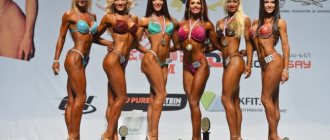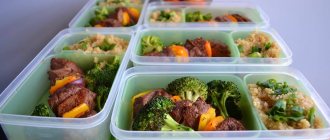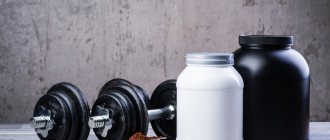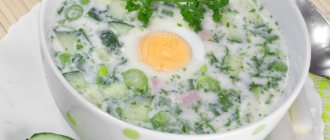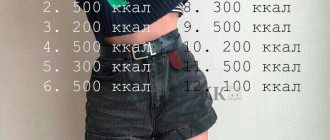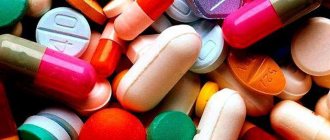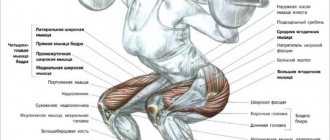Why should you drink during exercise?
A person is mostly composed of water: the brain is 80%, muscle tissue is 70%, blood plasma is 90%. It participates in all vital processes of the body and is a natural cleanser of the digestive tract from waste and toxins.
During intense physical activity, thermoregulation mechanisms are triggered, which are accompanied by profuse sweating. The evaporation of water from the surface of the body promotes natural cooling, but along with it there is a loss of vital minerals and an imbalance in electrolyte balance. Not drinking enough fluids during exercise puts your body at risk for:
- increases the load on the heart and blood vessels, because blood becomes more viscous;
- slows down the delivery of oxygen and nutrients to muscle tissue;
- reduces endurance and concentration during exercise and can lead to injury.
With a lack of water in the body, metabolic processes slow down and the breakdown of fat cells is impossible. The effect of fitness classes for weight loss is practically reduced to zero. Water helps build muscle mass - it ensures a complete supply of amino acids and nutrients necessary for the processes of their regeneration and growth to the muscles.
Losing just 2% of water reduces the effectiveness of your workout by 30% and can lead to heatstroke, dizziness, cramps and loss of consciousness. Dehydration of the body by 10-15% leads to death.
Drinking fluids when working out in the gym is necessary to reduce pain in the muscles after performing strength exercises and to prevent the development of degenerative joint diseases. Water is contained in the joint lubricating fluid, so its lack increases the load on the spine and joints, and they wear out faster.
Dehydration prevents you from training at full strength, reducing endurance and strength indicators. To achieve your sports goals, you must drink during exercise.
But excess fluid intake also harms the body:
- the concentration of minerals in the blood decreases, the water-salt balance is disturbed;
- if you have kidney problems, swelling may appear or blood pressure may increase;
- Digestive processes may be disrupted.
During training, it is recommended to drink 150-250 ml of liquid every 15-20 minutes, i.e. approximately 0.5-1 liter per hour. Its amount may vary depending on the air temperature, intensity and duration of loads. It is important to listen to your body and avoid feeling too thirsty. But if you don’t want to drink, you don’t need to force yourself to do it.
You should not try to drink the required amount of fluid before physical activity, so as not to be distracted by drinking during it. This will lead to heaviness in the stomach and frequent trips to the toilet.
Useful qualities
Already from the name it is clear that water with sugar consists of two ingredients. And to find out how harmful or beneficial it is, you need to understand how granulated sugar affects our body. Let's start with its beneficial properties.
Polish doctors, as a result of long research, discovered that if sugar does not enter our body for a long time, the work of many systems will soon be disrupted. This sweet food in the brain (both brain and spinal cord) activates the blood circulation process. If you give up sugar altogether, this threatens with sclerotic transformations.
Sweet water and sugar have the following beneficial properties:
- They reduce the likelihood of plaques appearing in blood vessels and prevent the development of thrombosis.
- People with a sweet tooth are less likely to suffer from arthritis than those who don’t like “sweets.”
- Granulated sugar improves the functioning of the liver and spleen. Anyone diagnosed with these ailments is prescribed a diet high in glucose.
- If there are not enough saccharides in the body, its work is disrupted: the blood begins to circulate more slowly, and the activity of the central nervous system worsens. If you drink water with sugar, you will be guaranteed a surge of energy and strength.
- Sugar has a positive effect on the visual organs. Do you spend a lot of time at the computer? Eat more sweets and drink sugar water.
- Sweet water stimulates memory. In general, everyone who is engaged in mental work needs glucose.
- Even a tiny dose of sugar is enough to improve a person’s mood and eliminate insomnia. It’s not for nothing that when you’re stressed, it’s recommended to eat more sweets.
- If the body receives little glucose, malfunctions of the liver, kidneys and gall bladder may occur. Often, for ailments of these organs, this substance is administered intravenously. Sugar water prevents the appearance of such pathologies.
- A glass of sweet water will give everyone a great mood. After all, sugar promotes the release of serotonin, the hormone of joy, into the blood.
If you are depressed or have a nervous breakdown, eat brown sugar.
What can you drink during training?
What is the best thing for athletes to drink during training? The choice of permitted drinks is quite wide:
- water;
- isotonics;
- natural juices;
- herbal infusions;
- B.C.C.A.
Preference for one drink or another should be given depending on the purpose of the workout, its duration and intensity.
Water
To avoid dehydration during exercise, it is enough to drink regular drinking water: filtered or bottled. Tap water or from natural sources may contain substances or microorganisms harmful to the body, so it must be filtered or boiled. But after boiling, there are practically no useful mineral salts left in it - most of it settles on the walls and bottom of the kettle.
Boiling water does not destroy hepatitis A viruses and botulism bacillus. It also contains phenols, pesticides, nitrates, heavy metal salts, and petroleum products.
Non-carbonated mineral water will help prevent electrolyte imbalance after intense workouts lasting up to 1 hour. You should choose mineral water marked “dining room”. The content of sodium, magnesium and potassium in it is optimal for the body. To replenish micronutrient deficiencies caused by physical activity, this is the best option. It is better to leave medicinal mineral water for use for other purposes - in case of diseases of the digestive system, it can provoke exacerbations.
Isotonics
Isotonic drinks are sports drinks that contain mineral salts and sugars in concentrations close to the composition of blood plasma. They are designed to quickly replenish lost minerals and glycogen during high-intensity and prolonged exercise. Some drinks may contain vitamins, flavorings, creatine and L-carnitine.
Isotonic drinks increase the body's endurance, but are absorbed into the blood more slowly than water. Therefore, drinking them when playing sports lasting less than an hour and a half or during low-intensity training is pointless.
A number of studies have found that drinking isotonic drinks without prolonged physical activity leads to excess weight. It is not recommended to drink them when doing fitness for the purpose of losing weight. The most popular isotonic sports drinks among athletes are:
- Powerade;
- IsoMax by Powerbar;
- Gotorade;
- ISO Drink Cool;
- ISO+ from Aptonia.
But you can prepare isotonic water yourself. There are several proven recipes.
- Simple. Mix 1/2 tsp in 400 ml of water. table salt and 200 ml of freshly squeezed fruit juice.
- "Sports Academy". 400 ml water add 200 ml fruit juice, 3 tbsp. sugar and ½ tsp. salt.
- With Regidron. Mix 1 packet of Regidron powder (sold in any pharmacy as a means to combat dehydration) in 1 liter of water with the juice of ½ lemon and 2 tbsp. honey.
- "Gleesonade." 5 tbsp. glucose (dextrose), ¾ tsp. table salt and 1/2 tbsp. dissolve soda in 500 ml of water and mix thoroughly.
It is convenient to pre-mix the ingredients in dry form and dilute them with water immediately before training.
When preparing an isotonic drink, table salt can be replaced with sea salt or sodium citrate (sodium salt of citric acid). The taste of the drink will be slightly different - with a slight sourness. Instead of natural juice, you can use dry fruit concentrate.
Natural juices
A good option for replenishing fluids in the body during strength training are natural juices from fruits or vegetables:
- apples;
- oranges;
- carrots;
- pumpkins;
- grapefruits;
- pineapples;
- tomatoes;
- citrus mixtures.
They maintain mineral balance in the body and provide additional energy for performing heavy exercises.
Juices must be freshly squeezed and diluted with water by half or in a ratio of 1:2. This will reduce the content of simple carbohydrates and help the drink be better absorbed.
A glass of orange or apple juice diluted in 2 glasses of mineral water will replace an 8% carbohydrate-containing solution, equivalent to a sports drink.
Herbal decoctions (infusions)
Using herbal decoctions during sports training will increase their effectiveness and help get rid of discomfort after exercise. Herbal drinks contain vitamins, minerals and phytocomponents that have a tonic effect.
For active training, infusions and decoctions from the following plants are best suited:
- rose hip;
- thyme;
- Chinese lemongrass;
- ginseng;
- Eleutherococcus;
- yarrow;
- St. John's wort;
- ginger.
There is no need to brew herbal tea that is too strong for use during training. The optimal dosage is 2 tbsp. dry raw materials per 1 liter of water.
Herbal infusions are good for weight loss. They contain virtually no calories and help speed up metabolic processes in the body.
The use of some herbs can cause allergies, so you should drink decoctions with caution, starting with a small volume (100 ml). Also, we must not forget about the medicinal properties of plants - certain herbs may be contraindicated for certain chronic diseases or health conditions.
BCAA
BCAAs are three essential amino acids (isoleucine, leucine, valine) that help increase strength and endurance when performing strength exercises. The intake of BCAAs into the athlete’s body during training will not only add energy, but also speed up the process of muscle regeneration and slow down catabolism - the destruction of muscle fibers.
In one study, a group of athletes took 6 g of BCAAs during training for 3 months. The effect of a sharp acceleration of protein synthesis amazed the scientists: all subjects added 1-1.5 kg of lean muscle mass during this time.
Unlike protein shakes, which require time to be broken down and absorbed in the digestive tract, amino acids in sports supplements are absorbed into the bloodstream instantly. Therefore, in order to increase muscle mass and increase endurance, it makes sense to take them throughout the entire workout.
BCAAs do not replenish electrolytes in the body, as they are intended for other purposes. When playing sports, amino acids should be consumed together with water or an isotonic drink.
What drinks are useless to drink during training?
Sports drinks such as fat burners, creatine and protein help you achieve your goals faster when working out in the gym and are certainly useful for gaining muscle mass, losing weight or cutting. But you should drink them at least 40-60 minutes before training or within an hour after it. Taking these drinks during exercise will not bring much harm to the body, but there will be no significant benefit from it either.
Fat burners
Sports supplements with fat-burning properties based on thermogenics (caffeine, yohimbine, synedrin) or lipotropics (L-carnitine, omega-3, betaine) are effective for weight loss only if taken before training - at least 40 minutes before. If used later, they simply will not have time to act. They do not restore electrolytic balance.
If the use of lipotropics during training does not cause harm to the body, then taking thermogenics increases the load on the cardiovascular system and can cause a sharp rise in blood pressure.
Gainers
Gainer is a high-calorie sports supplement consisting of a mixture of carbohydrates and proteins. Its main purpose is to speed up the gain of muscle mass for thin people.
Gainers are recommended to be consumed 1 hour before training. If you drink a portion of a protein-carbohydrate drink during exercise, it will cause a rush of blood to the stomach, a feeling of fullness and heaviness in the abdomen.
After eating carbohydrates, insulin levels will increase sharply, which will lead to the suppression of testosterone (the muscle growth hormone). A small amount of carbohydrates during training will help cope with fatigue and give you strength, but a whole portion of gainer will be unnecessary. It makes sense to drink carbohydrate-protein mixtures only if the training lasts more than 1.5-2 hours. 100 g of gainer every 15-20 minutes is the optimal amount.
Carbohydrate-protein mixtures are good for use not only in bodybuilding. They add energy and endurance to athletes involved in athletics, skiing, boxing, etc. in any direction of sport where aerobic exercise predominates.
Creatine
Creatine (nitrogen-containing carboxylic acid) is involved in energy metabolism in muscle tissue and, when taken correctly, increases athletic performance.
The best time to take creatine is within an hour after training. During this period, the muscles are most susceptible to its absorption.
Creatine is not able to compensate for the loss of mineral salts, but its use during strength training contributes to dehydration of the body (dehydration). Combined with profuse sweating, it can lead to electrolyte imbalance.
Protein
Taking protein before training saturates the blood with amino acids, suppresses catabolic processes and creates additional conditions for muscle growth. But even fast proteins (in the form of hydrolyzate or isolate) need at least an hour to be absorbed. Eating protein during training will make it difficult to perform exercises and slow down the process of muscle growth - the body perceives them as food, the digestion of which requires energy, and they already decrease with every minute of training.
Protein shakes taken during training will not be beneficial for muscle gain, recovery or weight loss.
Water
If your run lasts no more than an hour at an average pace, then your needs can be satisfied with water and it is not at all necessary to weigh yourself down with bottles of sports drinks and tubes with special gels.
Your average pace is the running pace at which you can hold a conversation without getting out of breath.
So, if your run lasts no longer than an hour and you maintain your average pace, water is your choice.


